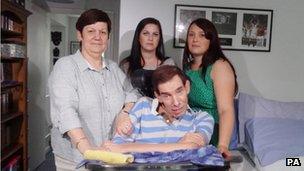Tony Nicklinson's family carry on right-to-die fight
- Published

The family of a man who fought for the right-to-die hope to continue the campaign after seeking permission to appeal against a High Court ruling.
Tony Nicklinson, 58, who suffered from locked-in syndrome, died in August, a week after losing his legal bid to end his life with a doctor's help.
His family have lodged papers at the Court of Appeal asking to allow his widow, Jane, to take up his case.
Mr Nicklinson was paralysed from the neck down after a stroke in 2005.
The father-of-two was left "crestfallen" by the court decision on his right-to-die bid, and after refusing food he died from pneumonia at home in Melksham, Wiltshire.
Mrs Nicklinson pledged in September to continue her husband's fight but High Court judges refused to make her party to the proceedings.
The judges said they were "deeply conscious of her suffering" since Mr Nicklinson's stroke, but said they did "not consider that the proposed appeal has any real prospect of success".
The Nicklinson family have confirmed they have lodged papers with the Court of Appeal seeking to overturn that decision.
'Positive step'
Mrs Nicklinson admits it is likely to be a long campaign, fraught with legal technicalities, but said the family was determined to continue.
She said: "This is part of Tony's legacy, we're fighting for him, on his behalf. We really have no idea of when there will be a decision, and even then it will just give us permission to appeal the High Court ruling.
"But this is a positive step for our campaign. It is a long process, but one we will carry on for as long as we can."
In August, the three High Court judges referred to the "terrible predicament" of Mr Nicklinson and described his case as "deeply moving and tragic".
But Lord Justice Toulson, Mr Justice Royce and Mrs Justice Macur unanimously agreed it would be wrong for the court to depart from the long-established legal position that "voluntary euthanasia is murder, however understandable the motives may be".
The judges also heard that a second applicant known as "Martin" needed assistance to end his life after a stroke.
But they ruled that the current law did not breach human rights and it was for Parliament, not the courts, to decide whether it should be changed.
- Published2 October 2012
- Published28 August 2012
- Published23 August 2012
- Published22 August 2012
- Published22 August 2012
- Published19 June 2012